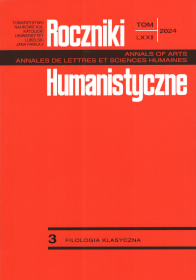In vino veritas, in aqua sanitas. La poétique sympotique dans le poème Tempus fugit (conte) de Tadeusz Różewicz
In Vino Veritas, in Aqua Sanitas. Sympotic Poetics in the Poem of Tadeusz Różewicz
Author(s): Joanna Hobot-MarcinekSubject(s): Language and Literature Studies, Philology
Published by: Towarzystwo Naukowe KUL & Katolicki Uniwersytet Lubelski Jana Pawła II
Keywords: symposion; sympotic poetics; wine; serious; mind; jester; sage; senile poetry; epistolography; Różewicz
Summary/Abstract: The subject of the present considerations is the phenomenon and topos of the symposion and its contemporary reinterpretations in the works of Tadeusz Różewicz written by him in the final years of his life. In his late works, the poet willingly plays the role of a sage and jester, combining the serious with the light-hearted and the trivial with the sublime. Różewicz’s references to the rules of sympotic poetics and the poet’s play with sympotic conventions are a key element of the poem tempus fugit (tale), which is a literary reference to Plato’s Banquet, Athenaeus’s Banquet of the Learned and Xenophon’s Banquet. The poem tempus fugit (tale) is therefore a description of humorous and intellectual debates on cuisine, visual arts, literature and philosophy, conducted by the poet with his friends Ryszard Przybylski (essayist, translator and historian of Polish and Russian literature), Piotr Lachmann (director and founder of the experimental “Poza” theatre) and Jerzy Nowosielski (painter, stage designer, Orthodox theologian and icon-maker). The interpretative context of the poem discussed in the article is the poet’s long-term epistolary exchange with Ryszard Przybylski and his critical essay “Notes to Nowosielski.”
Journal: Roczniki Humanistyczne
- Issue Year: 72/2024
- Issue No: 3
- Page Range: 39-57
- Page Count: 19
- Language: French

